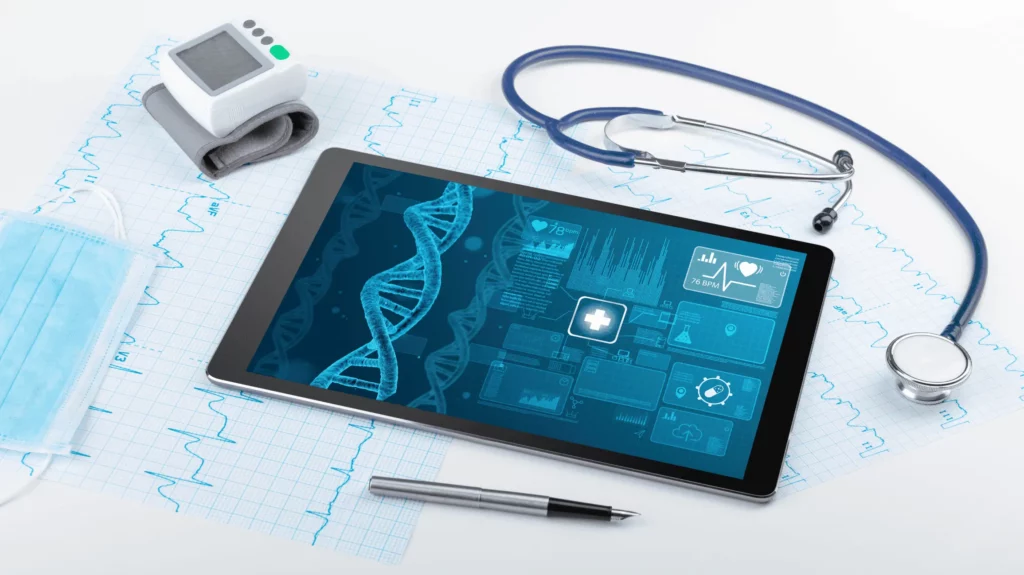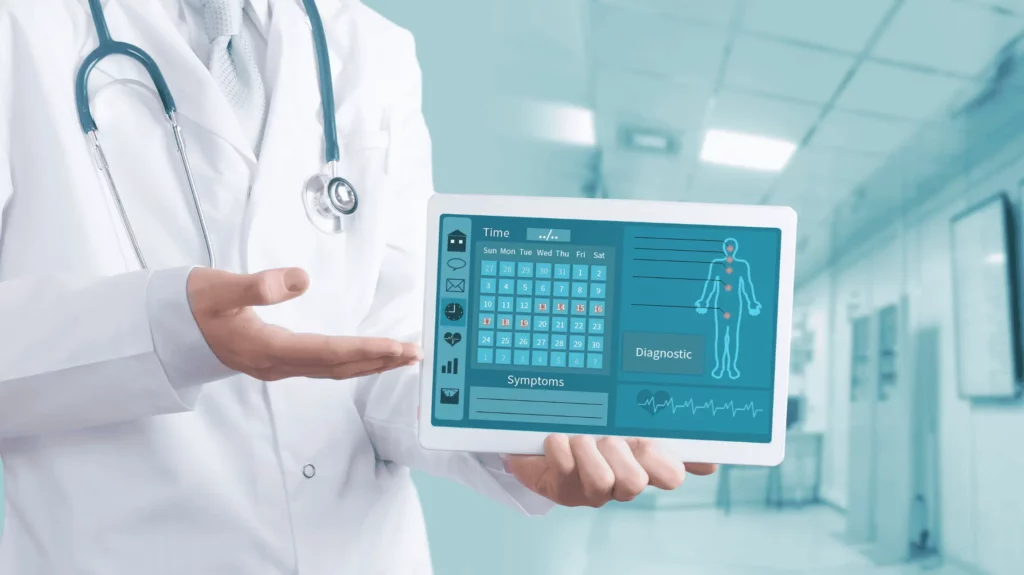Healthcare providers must adopt DevOps in healthcare to make data accessible and secure.
Healthcare DevOps improves software excellence, speed to market, and seamless communication between operations and development teams. DevOps practices help healthcare organizations enhance efficiency, streamline processes, and deliver the highest quality solutions for better patient care.
The global DevOps market continues to grow to a projected $25.5 billion by 2028. Healthcare technology companies and providers seek the best practices to define, implement, and realize the greatest benefits of DevOps in healthcare.
What Is DevOps In Healthcare And How Does It Work?
In simple terms, DevOps is a combination of software development (Dev) and IT operations (Ops), emphasizing collaboration, communication, and integration between the two for an increase in productivity. The ultimate goal of DevOps is to break down silos and automate processes between development and operations teams, therefore streamlining the entire software delivery process.
DevOps in healthcare refers to the application of DevOps principles and practices in the healthcare industry to speed up the lifecycle of medical applications. Particularly, by leveraging a continuous integration/continuous deployment (CI/CD) pipeline, DevOps allows for iterative enhancement in product development. In the long run, this methodology helps healthcare organizations navigate the intricacy of clinical workflows, interoperability, and other stringent health information exchange regulations.

Furthermore, DevOps promotes the use of automated testing methods like test-driven development and behavior-driven development. These testing approaches are essential in ensuring the accuracy and reliability of complex algorithms used in diagnostic software, patient management systems, and telehealth solutions.

What are the Benefits of Implementing DevOps in Healthcare?
DevOps in healthcare delivers extraordinary benefits:
- Rising engagement
- Better data management practice
- Automated development process
- Data security and regulatory compliance

1. Rising Engagement
Healthcare organizations that implement CI/CD pipelines often provide more customized features and solutions, resulting in improved patient experience. For instance, self-check-in systems that expedite patient processing, or electronic prescription filling that enable patients to access medications remotely.
These advancements cater to patients’ requirements for instant and quality care. Therefore, healthcare providers can also leverage them, such as implementing automated appointment scheduling, to improve operational efficiency while maintaining exceptional care delivery.
2. Better Data Management Practice
For a healthcare solution to be both cost-efficient and responsive, it must first be data-driven. Using data-centric approaches not only improves efficiency but also provides organizations with a competitive edge by offering invaluable insights to patients. However, healthcare institutions often produce massive volumes of data that exceed the capacities of traditional tools.
DevOps toolchains facilitate the management of data pipelines and big data applications, empowering healthcare providers to handle a wide range of data. This includes lab reports, medication information, electronic health records, and even insurance reimbursement. Such diverse datasets can bring healthcare providers comprehensive analysis and insights.
3. Automated Development Process
DevOps aids healthcare organizations in establishing a continuous integration and continuous deployment (CI/CD) pipeline specific to healthcare. This DevOps in healthcare pipeline operates in a loop, incrementally creating and deploying applications while seamlessly integrating automation into existing systems. By doing so, healthcare organizations can easily meet service level agreements (SLAs) while efficiently managing resources. Furthermore, the implementation of standardized processes ensures seamless deployment, allowing organizations to quickly build and deliver applications.
4. Data Security and Regulatory Compliance
By embracing the core principle of DevOps, “infrastructure as code,” healthcare providers can incorporate security fundamentals directly into their application modules.
This is called DevSecOps – a practice that involves conducting vulnerability analysis during pipeline implementations. It enables engineers to proactively address potential vulnerabilities during the development and deployment process.
Moreover, the principle of “least privilege” is applied to restrict access, ensuring that only authorized individuals and machines have access to critical areas of the system
Guide for Effective DevOps Adoption in Healthcare
DevOps has become the development strategy of choice for 73% of medical IT teams. Let’s explore the essential steps for adopting DevOps in your healthcare organization:
- Planning
- Use a version control system
- Continuous integration
- Automated build
- Continuous testing
- Continuous deployment
- Monitoring and constant feedback

1. Planning
Planning is the initial stage of the DevOps process. It involves evaluating your operational and development activities and aligning them with the principles of the DevOps methodology. This stage also requires you to assess your technical and human resources, inventory, software guidelines, and security policies. In some cases, the planning phases may involve coordinating meetings with various teams for task allocation.
2. Use a Version Control System
Having a version control system is crucial for developers to coordinate and manage coding in the context of DevOps in healthcare. It allows tracking of custom healthcare solution code repositories and the applied changes. In DevOps healthcare software development, developers should have an offline copy of the code repository, while keeping a record of every change made on the main server.
3. Continuous Integration
The central repository should receive all system changes and new code modules from the CI server. This facilitates code sharing and merging across different departments, while also ensuring efficient code management to avoid any potential delays.
4. Automated Build
Enable automation for integrated care solutions by deploying scripting and automated code retrieval. This enables recovery from the code repository and compilation into a binary artifact for periodic testing.
5. Continuous Testing
The shared repository must undergo continuous testing to verify its functionality. If the test returns positive results, it proceeds to the next phase. However, if the test fails or is inconclusive, the system analyzes the error and cross-references it with its database. This process is conducted to identify known errors and, in the case of a new error, generate a report and initiate an incident. The incident is then assigned to the development team, who will track its progress using an incident tracker.
6. Continuous Deployment
If the code passes the tests, it is deployed on either the production or development system, depending on the company’s protocol. This guarantees swift and continuous code deployment.
7. Monitoring and Constant Feedback
DevOps relies on sustainability as its foundation. Implementing continuous monitoring is crucial for ensuring the optimal performance of healthcare software development applications. Also, organizations should look into every minor detail of the project while gathering feedback periodically through self-monitoring analytics.
Overcoming Common Challenges in DevOps Implementation
Being a provider of DevOps services, we have witnessed numerous hurdles that prevent healthcare companies from adopting this methodology. Here are some notes to consider if your goal is a seamless and hassle-free implementation of DevOps in healthcare:
- Ensure the sustainability of your DevOps environment
- Adopt continuous skills development
- Keep up with AI and analytics tools
- Allocate your resources effectively
- Consult with DevOps experts
1. Ensure The Sustainability of Your DevOps Environment
In DevOps, code ownership is shared among different teams, leading to additional work and time spent on setting up environments and making code changes.
The solution here is to create infrastructural blueprints that serve as a central reference for all stakeholders to keep all environments consistent with each other. This approach establishes a unified platform for coding and testing, making it easier to access, facilitating continuous development, and improving overall efficiency.
2. Adopt Continuous Skills Development
The software team’s success in navigating the DevOps transformation is closely linked to their technical and human resources. As part of the core principle of DevOps in healthcare – continuous everything, healthcare organizations should invest in cutting-edge tools and internal training to foster a strong DevOps culture and expertise within the team.
3. Keep Up With AI and Data Analytics
In today’s healthtech industry, the main focus is on merging data analytics and AI/ML technologies to enhance data processing and, consequently, improve patient outcomes.
However, it is crucial for DevOps engineers to thoroughly assess the performance and security measures of any external tool, as they can damage the functionality and integrity of your healthcare solution.
4. Allocate Your Resources Effectively
People tend to choose the optimum tools and technologies, assuming they will deliver top-notch performance. However, they may not fully leverage all the available resources that those tools provide. Therefore, it is crucial to invest time in optimizing your environment settings to maximize the value of your resources.
5. Consult with DevOps Experts
Boarding a specialized DevOps team can greatly alleviate the burden on internal resources of healthcare organizations. This allows the in-house team to prioritize patient-centric goals instead of being hindered by technical obstacles.
Furthermore, healthcare firms may pile up technical debt over time due to legacy system maintenance or rushed development cycles. However, dedicated DevOps engineers, with their extensive tooling and platform knowledge, can step in to modernize your systems without disrupting current service operations.
Unlock the Full Potential of DevOps with KMS Healthcare
The DevOps engineering approach provides well-defined processes, powerful tools, and seamless collaboration between developers and operations for healthcare software development. Growing DevOps adoption promises increased efficiency for healthcare organizations through streamlined infrastructure provisioning and application deployment.
Choose an experienced technology partner to power DevOps in healthcare for your company.
KMS Healthcare, with more than 14 years of healthcare software development experience, offers innovative, tailored solutions, industry expertise, and a track record of customer satisfaction. We can customize our collaboration model to suit your specific needs, be it onboarding DevOps experts for a startup or forming a long-term partnership.
Schedule a free consultation with us now to implement the best and most cost-effective DevOps model for your healthcare software teams.

FAQs
1. How does DevOps address compliance with healthcare regulations like HIPAA, GDPR, and others?
DevOps addresses compliance with healthcare regulations by adopting its extension: DevSecOps. DevSecOps stands for development, security, and operations. It promotes a security-first mindset, continuous compliance monitoring, and collaboration among development, operations, and compliance teams.
Moreover, DevOps emphasizes the use of immutable infrastructure and continuous improvement to meet evolving compliance requirements. That’s why DevOps can help healthcare organizations ensure compliance with healthcare regulations while delivering high-quality software.
2. How does real-time monitoring in DevOps help in predictive maintenance and improving patient care services?
DevOps teams can ensure optimal system performance and reliability by actively monitoring system performance, application logs, and user interactions. Through real-time anomaly detection and proactive maintenance, they gain the ability to predict and prevent system failures or downtime.
Also, by implementing predictive maintenance, healthcare organizations can guarantee the availability and dependability of vital systems, ultimately resulting in enhanced care services.
3. What kind of training and skill development are necessary for healthcare IT professionals to adopt DevOps practices effectively?
To adopt DevOps practices effectively, healthcare IT professionals require training and skill development in several areas. Regarding technical expertise, they should gain knowledge in cloud computing, infrastructure automation, and containerization technologies. Knowledge of configuration management tools, CI/CD pipelines, and version control systems is also essential.
Moreover, working in one of the most stringent industries like healthcare also requires security and compliance experience, as well as risk management. Additionally, proficiency in collaboration and communication skills, agile methodologies, and problem-solving are the soft skills needed to ensure effective DevOps implementation in healthcare.